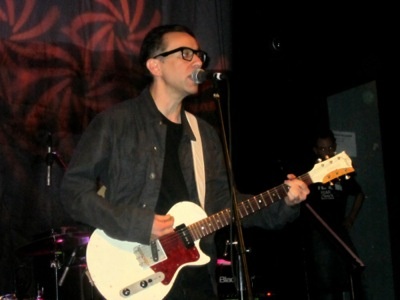A few days ago, during a packed performance by sepulchral metal doomsmiths Pallbearer and roaring, progressive Vikings Enslaved, I took a walk downstairs between sets to check out the t-shirts. I’m still wearing the Enslaved shirt I bought for $20 that night, which indicates three things: I was genuinely impressed by the band, pleased that some headliners will still sell shirts for under $30, and I seriously need to stop wearing this thing and do a load of darks.
While I was poking around before Enslaved, I saw the club calendar and saw that tickets were still available for the two scheduled Bob Mould shows, which seemed strange considering a slew of other acts I had never heard of—The Wood Brothers, Unknown Mortal Orchestra, Youth Lagoon, Frank Turner & the Sleeping Souls—were all sold out. So much for retaining hipster cred past 40.
Videos by VICE
The thing is, for those of us that came of age listening to music on boom boxes and portable cassette Walkmans, Bob Mould is fucking icon—a portly dude who’s ‘80s fierce-yet-melodic punk band Husker Dü laid the foundation for Foo Fighters, Green Day, and even Japandroids. Of course, if you bring up Bob Mould to today’s vinyl-toting hipsters, you’ll likely be met with, “Husker Who?”
And so, I was pleasantly relieved when I arrived at the venue to find the place pretty packed. The crowd was a strange mix of ‘90s alt-rockers who revel in the agro-melodies of Mould’s post-Husker band Sugar (Mould is still playing a large chunk of Sugar’s excellent Copper Blue album in a continued celebration of its 20th anniversary), and gay fans who champion Mould’s emotional vulnerability and political efforts to legalize same-sex marriage. The fact that Mould played a handful of songs from Silver Age, his best and most abrasive solo album in at least 15 years, was just a bonus.
Mould opened with the first five songs from Copper Blue, “The Act We Act,” “A Good Idea,” “Changes,” “Helpless,” and “Hoover Dam.” Although he was the only Sugar or Husker member onstage (the rhythm section was composed of bassist Jason Narducy and Superchunk drummer Jon Wurster, both of whom played on Silver Age), the music was energetic and heartfelt, instantly recognizable, but never drifted into mere nostalgia.
Looking at Mould, it’s clear that 20 years have passed since Copper Blue. His crew cut was gray as ash, and his spectacles and fuzzy blue plaid shirt made him look more like a cuddly grandpa than a roaring rocker. But his voice remained commanding and he still attacked the strings of his blue Fender Stratocaster with the hunger of a stray dog in a butcher’s shop. Silver Age numbers like “Star Machine” and “The Descent” sat well alongside the Sugar songs, even though they were a little repetitive and lacked the sublime songcraft of Copper Blue. Strangely, the only solo material Mould played was from his new album, and he only threw in one other Sugar song, “Come Around,” from the Beaster EP.

The rest of the set was composed of eight Husker Dü songs, six of which Mould saved for the two encores. Saturday Night Live and Portlandia star Fred Armisen joined the band for the first three and clearly relived his alt-rock youth as he grimaced along with the storming “Flip Your Wig” and grinned like a teenager who just lost his virginity for “Hate Paper Doll” and “Divide and Conquer.”
The show ended with one of Husker’s catchiest tunes, “Makes No Sense at All,” and as Mould sang, “Walking around with your head in the clouds makes no sense at all,” it became clear that—while he can still summon the demons of the past—Mould has become comfortable with his role as a melodic punk elder statesman and is even enjoying the experience. The rage and self-loathing that once threatened to consume him now makes no sense at all.
Jon Wiederhorn is the co-author of the book “Louder Than Hell: the Definitive Oral History of Metal,” which comes out May 14 on !t Books/Harper Collins. Follow him on Twitter – @louderthanhell
Previously – Ministry’s Last Stand Brings Al Jourgensen ‘From Beer to Eternity’




